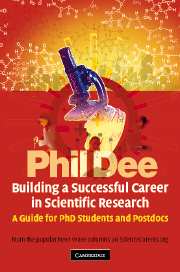Summary
Being successful in science is an acquired trait. No one is born an eventually successful scientist. Some people may be better endowed than others with core traits that help lead to success: Being very smart is useful, and we know there's a genetic contribution to intelligence. Some people seem to be temperamentally more creative than others. But just being smart and creative does not ensure stardom in science. Just as one has to learn the substance of one's field and the details of scientific methods and technologies, there is much to learn about science as an enterprise and a community of diverse individuals.
There is a sequence of educational phases one must go through before becoming an independent researcher, and much to know about how to thrive at each stage. The scientific community has its own set of unique values and behavioral norms. These need to be learned and incorporated into one's way of working and dealing with one's colleagues. Speaking of one's colleagues, scientists can be an extremely competitive bunch of people, and there is much to be learned about working within that club.
Finally, being a scientist is not a unitary thing. Science provides a very wide variety of wonderful career options, although few people really are aware of the breadth of them. Scientific careers can also be quite complex and take many different forms. Few people only do research.
- Type
- Chapter
- Information
- Building a Successful Career in Scientific ResearchA Guide for PhD Students and Postdocs, pp. ix - xPublisher: Cambridge University PressPrint publication year: 2006



